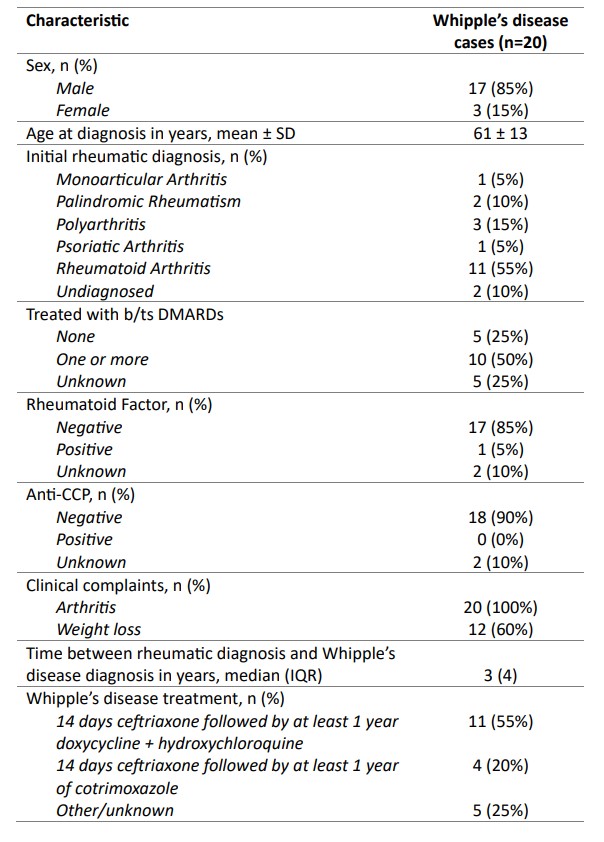Session Information
Session Type: Poster Session A
Session Time: 10:30AM-12:30PM
Background/Purpose: Whipple’s disease is a presumably rare, chronic infectious disease caused by the bacterium Tropheryma whipplei. Symptoms include weight loss, diarrhea, abdominal discomfort, joint pain (arthralgia) and arthritis.1 Prevalence of the disease is estimated at ten per 1.000.000 in the USA, but seems to be increasing due to improved diagnostic tools.2,3 Since many Whipple’s disease patients experience arthralgia or arthritis, they are often initially misdiagnosed with rheumatic diseases such as rheumatoid arthritis. Besides persistence of symptoms, misdiagnosis can also lead to incorrect, harmful medication prescription and delayed correct diagnosis of Whipple’s disease.4 Knowledge on Whipple’s disease in rheumatic patients may facilitate early detection and prevent misdiagnosis.
The current study aims to describe the clinical characteristics of patients with Whipple’s disease initially diagnosed with rheumatic diseases at the Sint Maartenskliniek.
Methods: Patients diagnosed with Whipple’s disease were selected retrospectively from electronic health records of the rheumatology department of the Sint Maartenskliniek, the Netherlands, from April 2012 to March 2024. Patients were included if Whipple’s disease was confirmed by histological staining of duodenal biopsies and/or polymerase chain reaction tests on blood, feces, synovial fluid, or duodenal biopsies detecting DNA of Tropheryma whipplei. Patient, disease, and treatment characteristics were collected from electronic health records and are presented using descriptive statistics.
Results: 20 patients were diagnosed with Whipple’s disease in 21.794 patient records (0.09%). Characteristics are described in Table 1. 17 (85%) patients were male and three (15%) were female. All Whipple’s disease patients presented with rheumatic symptoms, such as arthritis. 12 (60%) patients reported weight loss prior to their Whipple’s disease diagnosis. 18 patients were tested for rheumatoid factor, of whom 17 were negative. All 18 patients tested for anti-cyclic citrullinated peptide (anti-CCP) were negative. 10 patients were once treated with biological/target synthetic disease-modifying antirheumatic drugs (b/ts DMARDs), which were all discontinued after the Whipple’s disease diagnosis. Median time between initial rheumatic diagnosis or onset of rheumatic symptoms and diagnosis of Whipple’s disease was 3 years (interquartile range of 4 years). A recurrence of Whipple’s disease was identified in a patient previously diagnosed with Whipple’s disease 22 years ago. All patients showed improvement of their symptoms after antibiotic treatment.
Conclusion: Whipple’s disease was prevalent among patients with rheumatic symptoms. More research is needed to provide insights in discriminating factors between patients with Whipple’s disease and patients with rheumatic diseases. This will facilitate earlier detection and treatment of Whipple’s disease in the future.
References
1 Kucharz, E. J. et al. Reumatologia/Rheumatology 59, 104-110 (2021).
2 Dolmans, R. A. et al. Clinical microbiology reviews 30, 529-555 (2017).
3 Elchert, J. A. et al. Dig Dis Sci 64, 1305-1311 (2019).
4 Delarbre, D. et al. La Revue de Medecine Interne 42, 801-804 (2021)
To cite this abstract in AMA style:
den Hertog J, Wientjes M, ten Oever J, Opdam M, Telgt D, den Broeder A. Whipple’s Disease in Patients Initially Diagnosed with Rheumatic Diseases: A Case Series [abstract]. Arthritis Rheumatol. 2024; 76 (suppl 9). https://acrabstracts.org/abstract/whipples-disease-in-patients-initially-diagnosed-with-rheumatic-diseases-a-case-series/. Accessed .« Back to ACR Convergence 2024
ACR Meeting Abstracts - https://acrabstracts.org/abstract/whipples-disease-in-patients-initially-diagnosed-with-rheumatic-diseases-a-case-series/

